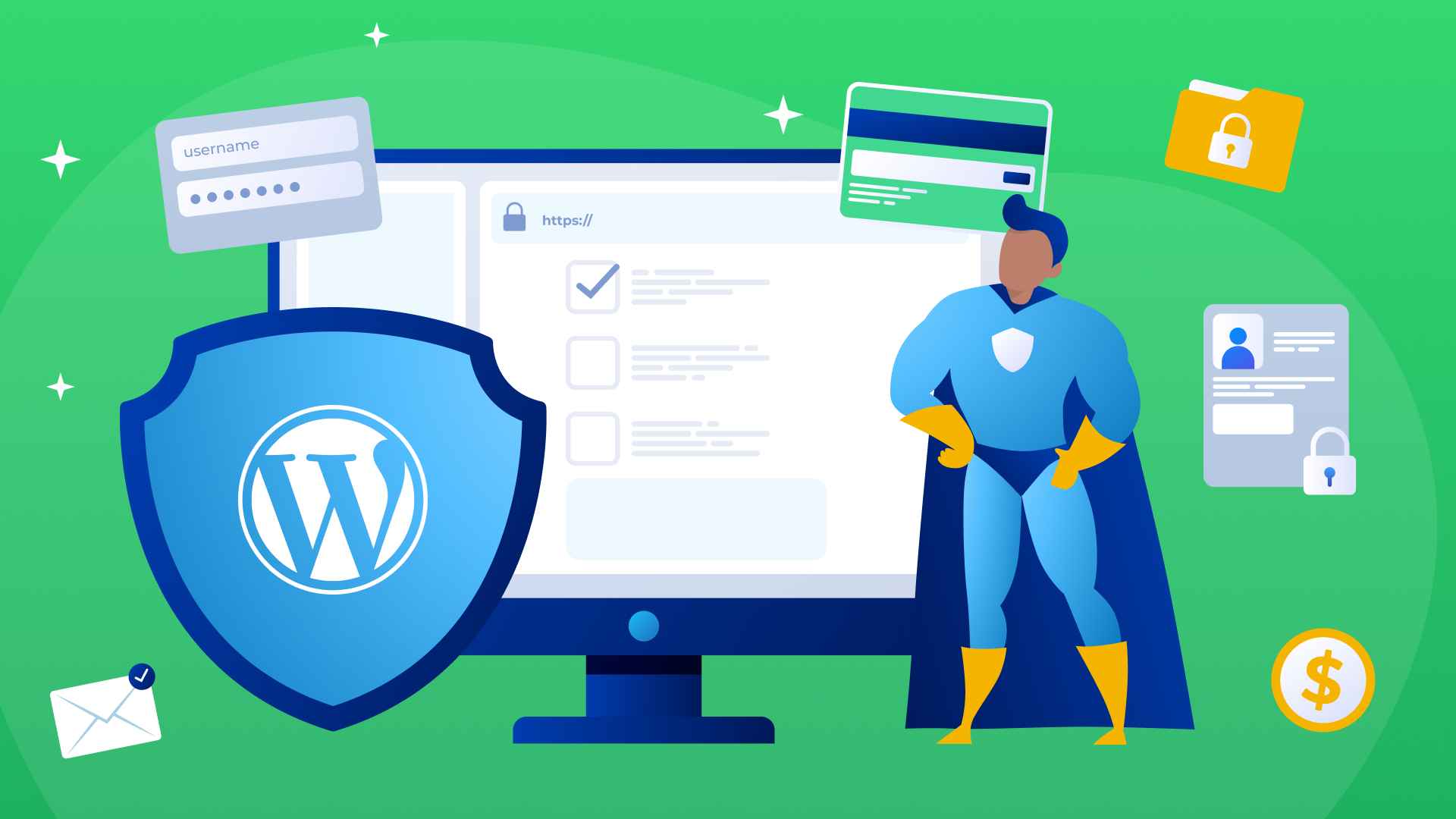As the king of CMSs, WordPress is certainly an appealing platform, but it’s also a battlefield where webmasters and cybercriminals constantly seek to gain the upper hand.
Today, it is the most commonly hacked CMS.
Protect Yourself and Your Website
If you find this concerning, keep reading on how to protect your WordPress website from cybercriminals and their relentless efforts to exploit your security vulnerabilities.
List of WordPress Website Security Attack Vectors
- Security Misconfiguration – This involves incorrect settings that leave your website vulnerable.
- Insecure Deserialization – Altering serialized objects (a format for storing and transferring data), which can result in attacks.
- Clickjacking – Deceiving users into clicking on hidden links.
- Local File Inclusion (LFI) – Causing the target site to process malicious files on its web server.
- Cross-Site Scripting (XSS) – Injecting malicious scripts into web pages viewed by other users.
- Password Exploits – Using easily guessable or insecure passwords to gain access to a website.
- Distributed Denial-of-Service (DDoS) Attack – Flooding services with unwanted connections.
- Cross-Site Request Forgery (CSRF) – Forcing users to perform unwanted actions.
- Remote File Inclusion (RFI) – Importing and executing external files on a server.
- Unvalidated Redirects and Forwards – Deceiving users to lead them to malicious sites.
- Malware Infections – Infections with various types of malicious software.
- Brute Force Attacks – Repetitive login attempts to gain unauthorized access to sensitive systems and user data.
- SQL Injection (SQLi) – Injecting malicious SQL code into a database to manipulate or access data without authorization.
- XML External Entity (XXE) Attacks – Exploiting an XML parser to access internal files.
- Authentication Bypass – Circumventing security measures to access protected resources without providing valid login credentials.
- Lack of or Outdated Security Patches – Leaving known security vulnerabilities unpatched.
- Insecure Direct Object References (IDOR) – Gaining unauthorized access to data by manipulating input parameters or URLs.
- Information Leakage – Unintentional exposure of sensitive information.
4 Common WordPress Security Vulnerabilities
- Out-of-date website
- Third-party access to your WordPress website
- Vulnerabilities in your WordPress website’s forms
- Admin email exploits
How To Protect Your Website from WordPress’s Security Vulnerabilities
Here we discuss the most common threats that WordPress websites face today and what you can do to protect yourself.
1. Out-of-Date Website
An outdated website might seem harmless, but it actually puts your site at risk. This is because outdated elements, such as plugins or theme files, are the types of gateways that cybercriminals look for when trying to access your website.
Sadly, despite the risk, many WordPress web owners allow their sites to fall behind on updates due to poor management and oversight.
Treat Your Website Security Like A Fancy Car
The first step to solving this issue is a simple mindset shift. If you treat your website like you would treat an expensive car and put the proper maintenance into it, you’ll avoid unnecessary trouble.
Outdated Website Database
Speaking of updates, many website owners often neglect their website’s database, where all their essential site data is stored. Let’s say, for example, that you’re using MariaDB (probably the largest database for any sort of cPanel or WordPress hosting), and it’s announced that your current version is nearing its end-of-life.
This means that your specific version of MariaDB will no longer receive security patches, and if you miss the announcement and don’t update your database in time, a hacker that is looking for an easy exploit may be attracted to your website.
It’s little things like this that can open up your website to attacks.
Outdated and Untrustworthy Plugins
In addition to database updates, an easy way to shore up your defenses and discourage an attack from an opportunistic hacker is to keep your plugins updated. Likewise, it’s a good idea to curate your plugins and only keep the ones that come from reliable sources.
On this second point, there’s a big difference between a well-built plugin and a plugin developed by a random developer who doesn’t have much experience. We’ve said to clients many times, “Hey, if you’re going to buy a plugin, buy from a reputable source like WooCommerce versus some random developer you’ve never heard of.”
If you don’t stay on top of your plugins, they can end up breaking and causing different issues for your website. For instance, we’ve seen many cases where websites stop delivering contact form submissions due to their form contact plugins being out of date.
Outdated WordPress Themes
It’s also necessary to update your themes regularly to keep up with changes in WordPress. As is the case with updating your database and plugins, this isn’t difficult to do, but it may be time-consuming and take attention away from running your business.
If you’d like to work with us to keep your WordPress website in top shape, you can schedule a discovery call here!
For more details about our website support services, check out our Ongoing Website Support page.
2. Third-party Access to Your WordPress Website
Like many other WordPress security issues, protecting your website often comes down to just using common sense. Obviously, you don’t want to give people you don’t know or trust access to your website.
From a site management standpoint, giving out your cPanel is like sharing your social security information. Generally speaking, only you, your webmaster, and your most trusted employees should have access.
With that said, if someone else does need access to your website, you can grant them limited access. Let’s say you hire someone to update your blog. Well, you can assign them as an “Author” or “Contributor,” which will limit their access only to creating and managing certain posts.
Login Monitoring Tools for WordPress
Beyond simple common sense measures, to enhance your website’s security, we suggest using plugins like Wordfence and Defender Pro, which excel at monitoring login attempts on your website.
Both plugins not only track and alert you of any suspicious activities but also offer a suite of additional security features, such as firewall protection and malware scans.
Note: Wordfence maintains an extensive database of blacklisted IPs, which they automatically block for you.
Regular Audits to See Who Has Access To Your Website
Conducting regular access audits can also help keep your website secure. In our opinion, it’s a good idea to conduct an audit every quarter. To assist you with this, there are several audit tools that are specifically designed for monitoring and managing user access called “activity log plugins” or “audit trail plugins.”
A quick Google search will show you the different tools that are currently available on the market, such as WP Activity Log.
Customizing Your WordPress Admin URL
Third-party access to your website can also be gained through your default WP admin. In fact, hackers can use developer tools to gauge your website’s security, and if they detect any vulnerabilities, especially with the default WP admin, they might attack your site.
To discourage this possibility, you can change your WordPress dashboard URL from the default website.com/wp-admin to something unique.
Additionally, you can set up a feature on your website that blocks anyone attempting to access your default WP admin, as this indicates they’re likely unfamiliar with your system. You can also implement a setting that blocks IP addresses after multiple failed login attempts.
For assistance with this, schedule a quick chat with Alex and the Sage team!
Strengthening Your Passwords with LastPass
Lastly, to reduce the possibility of third-party access to your website, we suggest enforcing strong password policies. Using passwords like “password123” or a username like “admin” is just asking for trouble. Always opt for more complex and unique passwords, as well as unique usernames.
PS We’re big fans of LastPass (not affiliated), which generates strong passwords and allows you to quickly and conveniently grant your team members access to your website.
3. Vulnerabilities in Your WordPress Website Forms
Did you know not all hackers need third-party access to your website to steal information from you? As a matter of fact, some hackers focus mainly on targeting weaknesses in the forms on your website, which is something that doesn’t require direct access to your website’s backend.
Forms that collect personal or financial information are especially common targets, with hackers often resorting to SQL injections to gain access to your website’s database.
Two Ways To Protect Your WordPress Website’s Forms
The good news is there are two things you can do to protect your forms.
One, use a Honeypot
The first tool you can use is called a Honeypot, which is especially good at detecting automated attacks. It works by embedding hidden fields within the forms on your website, and if a bot fills one of these hidden fields out, you’ll receive an alert.
Real users won’t see the Honeypot but bots inadvertently expose themselves by interacting with it.
This clever technique helps you weed out automated responses and fake form submissions.
Two, set the right permissions
After addressing the threat of automated bots with the Honeypot, it’s equally important to fortify your website against malicious file uploads, which is where this next point comes in.
It’s essential to set the correct permissions for file uploads. In most scenarios, only specific file types like PDFs, JPEGs, DOCs, or XLSs should be permitted. These formats are generally safe and cannot carry malicious codes like PHP.
When you block unauthorized file types, you prevent potential threats from being uploaded and residing on your server.
4. Admin Email Exploits
If you run a WordPress website, be extra careful what emails you click on. While everyone already knows not to click on spam emails, you’d be surprised how many people fall for more sophisticated phishing emails, including those who administrate WordPress websites.
The best way to avoid trickier phishing emails is to only click on emails from sources you recognize.
WordPress Phishing Emails Can Be Truly Deceptive
Hackers know the types of emails website administrators normally receive, which is why phishing emails targeted at WordPress website owners are so dangerous. Even more problematic is the fact that WordPress website owners receive a lot of emails that help them keep track of updates, plugins, and so on.
Bearing this in mind, one way to avoid getting phished is to avoid email login links as much as possible. It is safer to log into your admin panel directly.
Why Your WordPress Website’s Security Matters
In a single month back in 2016, Google blacklisted a staggering 20,000 websites for malware and 50,000 websites for phishing. Fast forward to 2023, and the methods that hackers employ have become more sophisticated, elusive, and downright nefarious.
This is why the cost of global cybercrime is rising. According to Cybersecurity Ventures, it is expected to reach $10.5 trillion USD annually by 2025 compared to $3 trillion USD in 2015.
You don’t want your business to end up as the next target.
For more details on how to bolster your WordPress website against the evolving cyber onslaught, read how our managed web hosting services can help fortify your site.
» MORE: Top 10 WordPress errors that can affect your website’s performance and security








